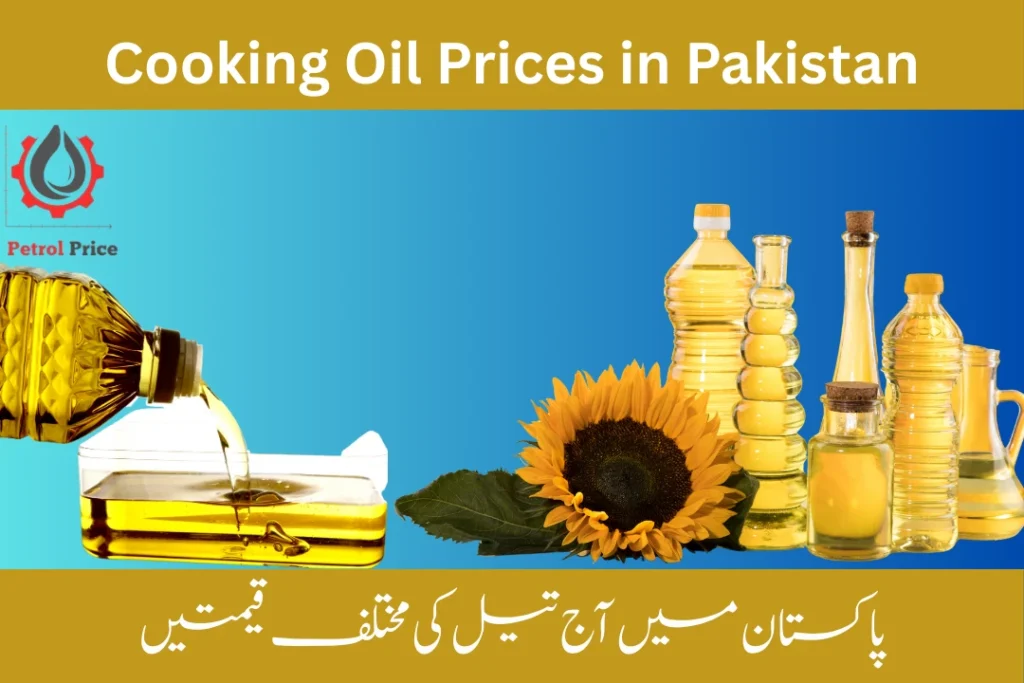Cooking Oil Prices in Pakistan – Updated September 2025
Oil is an essential but the cooking oil is important and essential commodity in every Pakistani household there are numerous brands available in the market and the prices of oil are different which vary on quality, brand reputation, and regional availability the current prices of popular cooking oil brands in Pakistan, including Kashmir, Sultan, Sufi, and Kisan. Below is a breakdown of their updated rates:
Current Market Prices (September 2025)
| Brand Name | Price per KG | Previous price | Change |
| Dalda Cooking Oil | 680 | 560 | ↑120 |
| Kashmir Cooking Oil | 690 | 570 | 120 |
| Sultan Cooking Oil | 670 | 550 | 120 |
| Khalis Cooking Oil | 675 | 555 | 120 |
| Karachi Cooking Oil | 630 | 510 | 120 |
| Sofi Cooking Oil | 700 | 555 | 120 |
| Kisan Cooking Oil | 675 | 555 | 120 |

Prices may vary city by city and retailer
Recent Price Increase
Price Surge: Cooking oil prices have experienced a significant increase of approximately 120 per kg across all major brands since the previous pricing data. This represents an average increase of 21-24% across different brands.
Market Impact: The substantial price increase affects the household budget significantly with families now paying considerably more for this essential commodity.
Regional Pricing Differences
The price of cooking oil can also different based on the region and cities. Karachi is a major metropolitan city that usually has competitive pricing due to its large number of retailers. However in the smaller cities or rural areas the cost of oil may be slightly higher due to transportation expenses and limited availability.
Regional Variations (September 2025):
Major Cities Karachi, Lahore, Islamabad Base prices as listed above
Secondary Cities: Add PKR 10-15 per kg
Rural Areas: Add PKR 20-30 per kg due to transportation costs
Read about : Petrol And diesel price Today in Pakistan
Factors Affecting Cooking Oil Prices in Pakistan
Cooking oil prices in Pakistan influenced by various factors that include :
Global Market Trends: International change in the cost of palm oil and other raw materials which impact local prices. Recent global crude oil price increases to $80 per barrel have contributed to higher production and transportation cost.
Currency Fluctuations: A devaluation of the Pakistani rupees which can lead to price increases, as most raw materials are imported. Despite recent stability at around Rs 281.94 against the USD, minor fluctuations continue to impact import costs.
Local Demand and Supply: The Seasonal demand such as during the month of Ramadan often causes a spike in oil prices. Current market conditions show increased demand with supply chain pressures.
International Supply Chain Issues: The Global supply chain disruptions and the increase in shipping cost have contributed to the recent price surge.
Government Policies: Import duties, taxes, and regulatory changes affect final consumer prices.
Consumer Recommendations
The current price scenario:
Bulk Purchasing: Consider the buying of cooking oil in larger quantities during promotional offers
Brand Comparison: Compare prices across different retailers before purchasing
Alternative Options: To Look for local or regional brands that may offer better value and low prices for cooking oil in Pakistan.
Storage: Proper storage can help maintain cooking oil quality for longer periods
Market Outlook for Cooking Oil
The cooking oil prices in Pakistan continues to face pressure from global commodity price increases and supply chain challenges. Consumers should expect prices to remain elevated in the near term, with potential for further increases if global oil prices continue their upward trend for Oil.
Conclusion
Cooking oil prices in Pakistan is different in all Cities and it is a vital and important part of Pakistani cuisine and keeping track of its prices is crucial for budget conscious consumers. While the popular brands of cooking oil like Kashmir, Sultan, Sufi, and Kisan and Dalda cater to different market segments, the recent significant price increases affect all segments equally. With current prices ranging from Rupees 630 to PKR 700 per kg, it is essential to choose a brand that balances quality and affordability. Consumers have to stay updated on prices and regional trends can help households make informed purchasing decisions during these challenging economic times.

